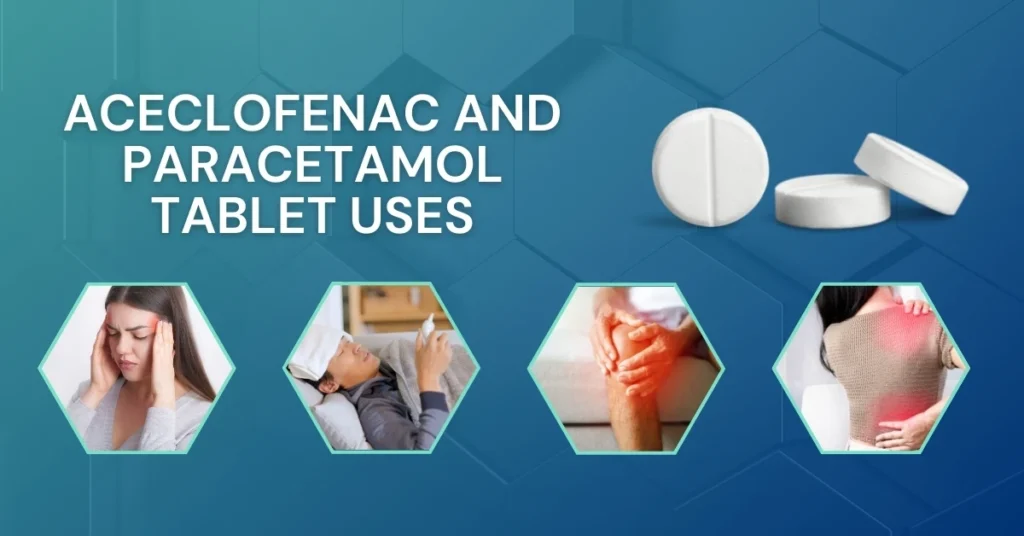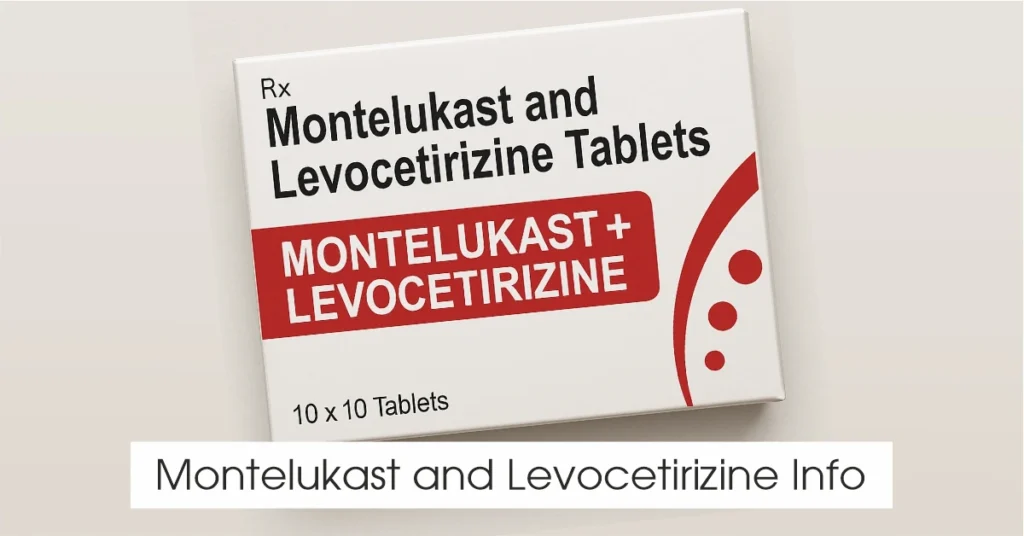Aceclofenac and Paracetamol tablet is a combination medication that doctors prescribe primarily to relieve pain and reduce fever. It contains two active ingredients: Aceclofenac, a non-steroidal anti-inflammatory drug (NSAID), and Paracetamol, an analgesic and antipyretic medicine. Aceclofenac helps reduce inflammation and swelling, while Paracetamol effectively reduces pain and fever.
General Conditions When Prescribed by Doctors
Doctors commonly prescribe this tablet for conditions involving mild to moderate pain, inflammation, and fever. Some of these conditions include:
- Joint pain and swelling due to arthritis (such as Osteoarthritis and Rheumatoid Arthritis)
- Muscle pain or stiffness
- Back pain
- Toothache
- Headache
- Pain and discomfort after injuries or surgeries
It’s important to remember that this medicine should be taken exactly as directed by your doctor. Taking it without proper medical advice could lead to unwanted side effects or complications.
Composition of Aceclofenac and Paracetamol Tablet
Aceclofenac:
Aceclofenac is a non-steroidal anti-inflammatory drug (NSAID). It works primarily by blocking certain chemicals in the body, known as prostaglandins, that cause inflammation, swelling, and pain. Doctors commonly prescribe Aceclofenac for conditions like arthritis, muscular pain, and joint discomfort.
Paracetamol:
Paracetamol, also known as acetaminophen, is an analgesic (pain-reliever) and antipyretic (fever reducer) medicine. It helps reduce mild to moderate pain and lower fever by acting on specific chemicals in the brain responsible for sensing pain and controlling body temperature.
According to the World Health Organization, Paracetamol is a non-opioid analgesic recommended for the treatment of mild to moderate pain, including headache, dysmenorrhoea, osteoarthritis, soft tissue injuries, and acute migraine. It also has antipyretic activity.
(Source: WHO Essential Medicines List – Paracetamol)
How does this combination work together?
When combined in one tablet, Aceclofenac and Paracetamol provide more effective relief from pain and inflammation. Aceclofenac tackles inflammation and swelling, while Paracetamol helps manage pain and fever. Together, they give a comprehensive approach to pain management, making the combination suitable for treating a variety of painful conditions.
Uses and Benefits of Aceclofenac and Paracetamol Tablet
Aceclofenac and Paracetamol tablets are prescribed by doctors to relieve various types of pain and reduce inflammation. Below are the main uses and benefits of this medication:
Pain Management
Headaches: This medicine effectively helps relieve headaches, including tension and mild migraine pain, by reducing pain signals in the brain.
Toothaches: It provides relief from dental pain such as toothaches, pain after tooth extraction, or discomfort due to dental procedures.
Muscle and Joint Pain: The anti-inflammatory properties of Aceclofenac reduce swelling and inflammation in muscles and joints, while Paracetamol helps manage pain. Doctors often prescribe this combination for conditions like sprains, strains, or minor injuries.
Fever Reduction
Paracetamol is effective in reducing body temperature during fever. This combination medicine is often recommended to patients experiencing fever along with body pain or inflammation.
Management of Arthritis and Inflammatory Conditions
Doctors commonly prescribe Aceclofenac and Paracetamol tablets for various arthritis-related conditions, including:
Osteoarthritis: A common type of arthritis causing joint pain, stiffness, and inflammation. This tablet helps reduce joint swelling and ease discomfort.
“According to a comparative study, 71% of patients treated with Aceclofenac reported improvement in pain intensity, compared to 59% in those treated with Diclofenac. The study also found Aceclofenac to be better tolerated with fewer gastrointestinal side effects.
(Source: PubMed – Study on Aceclofenac vs Diclofenac in Osteoarthritis)’
Rheumatoid Arthritis: An autoimmune disorder causing inflammation and pain in joints. Aceclofenac helps control inflammation, while Paracetamol manages pain effectively.
Ankylosing Spondylitis: A chronic inflammatory condition affecting the spine and joints. This medicine eases inflammation, reduces stiffness, and improves patient comfort.
Post-Surgical or Injury-related Pain Relief
After surgery or injuries, doctors often prescribe Aceclofenac and Paracetamol tablets to relieve pain, reduce inflammation, and speed up patient recovery by ensuring comfort during the healing process.
Dosage Recommendations for Aceclofenac and Paracetamol Tablet

Recommended Dosage for Adults
The usual recommended dosage of Aceclofenac and Paracetamol tablets for adults is generally one tablet (Aceclofenac 100 mg + Paracetamol 325 mg or 500 mg), taken twice daily. However, the exact dosage might vary depending on your medical condition, severity of symptoms, and how your body responds to treatment. Always follow the dosage prescribed by your doctor.
When to Take the Tablet: Before or After Meals?
It’s advisable to take this medication after meals to prevent stomach discomfort or acidity. Swallow the tablet whole with a glass of water without crushing or chewing it. Taking it after food reduces the risk of stomach-related side effects like acidity, heartburn, or indigestion.
What to Do in Case of Missed Dosage or Overdose?
Missed Dosage: If you forget to take a dose, take it as soon as you remember. If it is close to the time of your next dose, skip the missed dose and continue with your regular schedule. Never take two doses at the same time to make up for a missed one.
Overdose: Taking more than the recommended dose may cause serious side effects, such as nausea, vomiting, stomach pain, dizziness, liver problems, or kidney issues. If you suspect an overdose, immediately contact your doctor or visit the nearest hospital for urgent medical assistance.
Possible Side Effects of Aceclofenac and Paracetamol Tablet
While Aceclofenac and Paracetamol tablets are generally safe when used as prescribed, some patients may experience side effects. These side effects can be mild or serious, depending on the individual.
Common Side Effects
These side effects are common but usually temporary and manageable. They include:
Stomach Pain or Acidity: Taking this medicine might cause stomach discomfort, pain, acidity, or indigestion. To minimize this, always take the tablet after meals.
Nausea or Vomiting: Some individuals may feel nauseous or experience vomiting after taking the medicine. If these symptoms persist, inform your doctor.
Dizziness: You might feel slightly dizzy or lightheaded after taking this tablet. Avoid driving or operating machinery if dizziness occurs.
Serious Side Effects (Medical Consultation Needed)
Though rare, some serious side effects require immediate medical attention. Contact your doctor right away if you experience any of these symptoms:
Allergic Reactions: Symptoms may include skin rash, itching, swelling of the face or throat, breathing difficulty, or severe dizziness.
Kidney or Liver Complications: Symptoms might include dark-colored urine, yellowing of the skin or eyes (jaundice), unusual fatigue, or significant changes in urine output.
If you experience any serious or unusual side effects, immediately stop taking the medication and seek medical help.
Precautions When Taking Aceclofenac and Paracetamol Tablet
It’s important to take certain precautions to safely use Aceclofenac and Paracetamol tablets and minimize the risk of side effects or complications. Below are the key precautions:
Who Should Avoid Taking This Medication?
Certain individuals should avoid using Aceclofenac and Paracetamol tablets unless specifically advised by a doctor:
Pregnant or Breastfeeding Women: Pregnant women, especially in the third trimester, and breastfeeding mothers should avoid this medication as it may affect the baby’s health.
Patients with Liver or Kidney Diseases: Individuals who have pre-existing liver or kidney problems should avoid this medication or use it strictly under medical supervision, as it could worsen their condition.
Importance of Avoiding Alcohol
Avoid alcohol consumption while taking Aceclofenac and Paracetamol tablets. Alcohol can increase the risk of stomach irritation, liver damage, and may amplify side effects such as dizziness or drowsiness.
When to Consult Your Doctor Immediately?

Contact your doctor immediately if you notice any of the following symptoms:
- Severe stomach pain or unusual bleeding
- Dark urine, yellowing of the eyes or skin (signs of liver problems)
- Swelling of ankles or sudden weight gain (signs of kidney problems)
- Allergic reactions, including difficulty breathing, swelling of the face or throat, or skin rash
Always inform your doctor about your complete medical history before starting this medication to ensure safe and effective treatment.
Drug Interactions of Aceclofenac and Paracetamol Tablet
When taking Aceclofenac and Paracetamol tablets, it’s important to be aware of certain medications and supplements that could interact negatively. These interactions may reduce effectiveness, increase side effects, or cause unexpected health complications.
Medications That Might Interact Negatively:
Blood-thinners (Warfarin, Aspirin): Combining Aceclofenac and Paracetamol tablets with blood-thinning medications like Warfarin or Aspirin can increase the risk of bleeding. Always inform your doctor if you’re using blood-thinners.
Other NSAIDs (Ibuprofen, Naproxen): Taking Aceclofenac along with other NSAIDs can raise the risk of stomach irritation, ulcers, and bleeding. Avoid using multiple NSAIDs at the same time.
Herbal Supplements and Their Possible Interactions:
Certain herbal supplements may also interact negatively with this medication:
Ginkgo Biloba: Can increase the risk of bleeding when combined with NSAIDs or blood-thinners.
Garlic and Ginger Supplements: These supplements may also increase bleeding risks when taken along with Aceclofenac and Paracetamol.
Always discuss with your doctor or pharmacist about all medications and supplements you’re taking to prevent harmful drug interactions.
Conclusion
Aceclofenac and Paracetamol tablets are effective for relieving pain, reducing inflammation, and lowering fever. Doctors commonly prescribe this combination medicine for various conditions such as arthritis, headaches, muscle pain, toothaches, and post-injury pain relief.
However, like all medicines, it comes with certain risks, including stomach discomfort, nausea, dizziness, and potential serious side effects involving the liver or kidneys. People with existing health conditions—especially pregnant or breastfeeding women, and patients with kidney or liver diseases—should take special precautions or avoid this medication altogether.
To ensure safe use, always inform your doctor about all medications and supplements you’re currently taking, and strictly follow your doctor’s recommended dosage. Most importantly, never use Aceclofenac and Paracetamol tablets without proper medical consultation.
FAQs
Is Aceclofenac safe for kidneys?
Aceclofenac should be used with caution in patients with existing kidney problems. Long-term use or taking high doses can affect kidney function. If you have kidney disease or issues, inform your doctor before taking this medicine.
Does Aceclofenac make you sleepy?
Aceclofenac typically does not cause sleepiness. However, some people might feel slightly dizzy or tired after taking it. If you experience these symptoms, avoid driving or operating heavy machinery.
Is Aceclofenac banned?
No, Aceclofenac is not banned. It is widely prescribed by doctors as a pain reliever and anti-inflammatory medication. Always use it under medical supervision.
Is Aceclofenac a steroid?
No, Aceclofenac is not a steroid. It belongs to a group of medicines called non-steroidal anti-inflammatory drugs (NSAIDs), used to reduce pain and inflammation.
Is Aceclofenac good for back pain?
Yes, Aceclofenac is commonly prescribed for back pain because it effectively reduces inflammation and relieves pain. Always follow your doctor’s recommendations for dosage and duration.
How to store Aceclofenac + Paracetamol at home?
Store Aceclofenac and Paracetamol tablets in a cool and dry place, away from direct sunlight and moisture. Keep the tablets out of reach of children and pets. Do not use tablets beyond their expiry date.
Is Aceclofenac + Paracetamol useful in relieving stomach pain?
No, Aceclofenac + Paracetamol tablets are not typically prescribed for stomach pain. In fact, these tablets can sometimes cause stomach discomfort or acidity. If you have stomach pain, consult your doctor before taking any medication.
Is Aceclofenac good for throat pain?
Aceclofenac can relieve throat pain if the cause is related to inflammation. However, it is not commonly the first-choice medicine for throat pain. Consult your doctor before using it for throat-related issues.
Note: This article is intended for educational purposes only. Always consult your doctor or healthcare provider before starting any medication.



